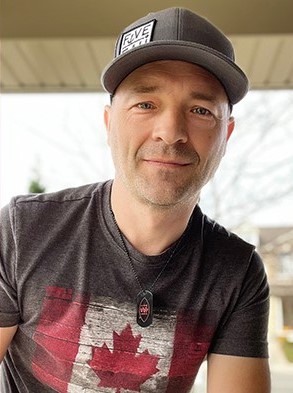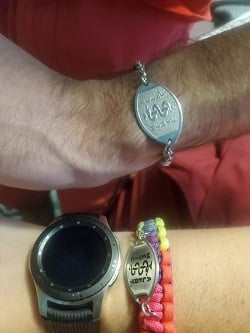Travis' Story: Beyond Fashion
 Have you ever wondered as you were going to bed if you would wake up the next morning? It’s not a question most of us ponder as we turn out the light, but for 48-year-old Travis, it’s a very real question based on an experience he had more than 20 years ago.
Have you ever wondered as you were going to bed if you would wake up the next morning? It’s not a question most of us ponder as we turn out the light, but for 48-year-old Travis, it’s a very real question based on an experience he had more than 20 years ago.
Travis lives with type 1 diabetes. Diagnosed at the age of 15 following a winter where he describes himself as not being well, Travis experienced the “usual” signs of diabetes such as excessive thirst and unexplained weight loss. It was a pivotal moment during which Travis learned to manage his illness during a seven-day stay in hospital that helped him get his blood sugar under control.
The native Newfoundlander, now a resident of Guelph, Ontario, recalls the dramatic change that happened in his life – which included his introduction to MedicAlert.
“There were doctors and nurses and dieticians who instilled in me the importance of managing my disease,” he says. “One dietician reminded me that it wasn’t about denying myself the sweets that I enjoy, it was about everything in moderation. I also learned the importance of having back-up in case I had an incident where I had a low, as I call it, and I wasn’t able to speak for myself.”
Despite Travis’ solid record of taking care of himself over the last 30 years by watching his diet and managing his A1C levels (a critical measurement of blood sugar levels), there have been a couple of times where things went off the rails. He recalls a trip back home to Cornerbrook when he was in his early 20s. He and his friends were staying at his grandparents house when one morning he simply did not wake up. His friends were panicked and called an ambulance. Paramedics were able to stabilize him, but it was a warning sign. He was also not wearing his MedicAlert ID at the time.
“There was a time when I thought I was too cool to be wearing a MedicAlert ID. I thought it was for older people. If my friends hadn’t been there, I’m not sure what would have happened. I may not like the ID, but I do now wear it. I realize it may not be part of my fashion sense, but it is an important part of my medical safety net.”
The second time Travis needed help was when his mother cut her hand badly while making dinner. They called an ambulance, and Travis followed in his car. Focused on his mom, he’d forgotten all about eating. As he drove back home he could feel his low coming on. He though all he needed to do was to be able to get some juice into himself, but it was too late. He could not manage that task. His mom called from the hospital to tell him she was going to be fine. Travis was barely able to answer the phone. She realized what was happening and asked the ambulance driver to go back and get her son.
“I guess that’s one of the benefits of living in a small city,” Travis jokes. But he realizes that he was on the verge of a diabetic coma, and while he remained conscious, his memory of the event is hazy.
Today, Travis’ safety net is much broader than it used to be. “I am a private person. I don’t like to ask for help. I realize that it’s important for people around me to know about my diabetes in case anything happens, and when I’m not with anyone else, my MedicAlert ID can speak for me.”
He’s also aware that his two children can also be a part of his safety net. “When they were younger, I didn’t feel the need to share much about my diabetes. Now that they’re older and with me 50 per cent of the time, the knowledge I share with them could be a game changer for me if I end up in trouble. Telling them that MedicAlert is there to help support them as well is an important part of that message. You never know when you just might not wake up in the morning.”



